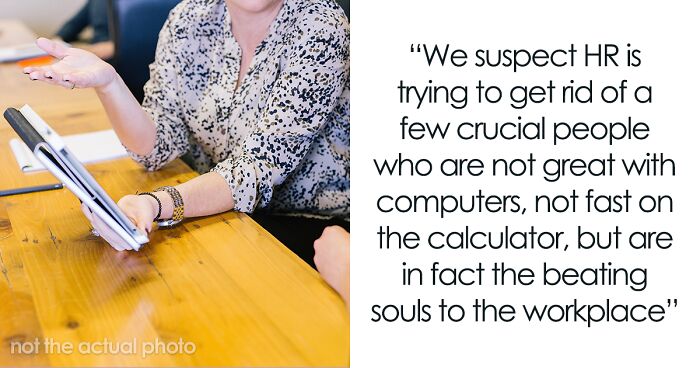
HR Makes Employees Take A Skill Test Designed For New Hires, They Maliciously Comply, HR Ends Up Scoring The Lowest
Companies put a lot of money, time, and hard work into training their employees. So it’s completely natural for them to want a good return on their investment.
But when Reddit user RevolutionFriendly56 and their colleagues learned that they will need to take a test to see how they measure up against the industry, they knew it was not going to be great.
The standardized assessment was far too simple to account for the complex nature of their work and couldn’t paint the complete picture. However, management wouldn’t budge and they had to do it.
Only, the workers devised and, most importantly, pulled off a smart malicious compliance plan.
This HR specialist thought it would be a good idea to measure how good the company’s employees are with a standardized industry test
Image credits: Amy Hirschi
But the idea quickly turned against them
Image credits: fauxels
Image credits: RevolutionFriendly56
Jörgen Sandberg, Professor of Management and Organization at UQ Business School and Warwick Business School, UK, said that when you ask HR managers what makes a person competent, they often respond with a list of skills. Can someone do this job? Certainly, if she can do X, Y, and Z. How has she performed in it? Very well, actually, because her language is fluent, and she’s comfortable with fluid dynamics. The attribute list also finds its way into training programs, which are designed to help employees hone their existing skills and acquire new ones.
But, as Sandberg pointed out in Harvard Business Review, frontline managers, similar to RevolutionFriendly56 and their colleagues, instinctively feel that competence is something more than a list of attributes.
“They sense that a person’s way of seeing work is just as important; competent workers have a particular vision of what their work is and why it is that way,” Sandberg explained. “And because they know that a person’s competence is not easily reduced to a standardized checklist of skills, frontline managers find the recruitment process difficult and are often dismissive of HR-inspired training programs.”
A study Sandberg conducted with a group of 50 testing engineers at the Volvo Car Corporation in Sweden revealed a wide variation in views about the skills that a good testing engineer needs. “Although members of the group generally agreed on who were the best engineers, they differed on why they were the best. Those differences, it seems, depended on how people understood the job,” the professor said, highlighting the subjective variance that comes with evaluating performance.
“Strikingly, all the subgroups agreed that the customer optimizers were the most effective at their work, and all thought that the sequential optimizers were the least capable. But the reasons given for these assessments differed, depending on how an individual defined the job.
“To identify how group members interpreted competence at work, I asked them to describe the qualities of a competent testing engineer and to explain their understanding of testing and development. Although there was some (but not unanimous) agreement on what kinds of skills were needed for competence, the descriptions of the skills varied widely and stemmed directly from the differences in the ways people defined the job,” Sandberg said. “I identified three subgroups of employees, each with a distinct job definition, work focus, and list of preferred skills.”
Those were sequential optimizers, interactive optimizers, and customer optimizers.
“These findings reveal the origins of many failures in corporate recruitment and training,” the professor noted. “If it’s this hard for a small group of technical people to agree on what makes them successful, how can we expect HR professionals to do any better, especially for jobs involving less repetitive and routine tasks? And if people don’t recognize or value the attributes that really determine success, how easy will it be for them to acquire those attributes?”
But maybe the test made RevolutionFriendly56’s HR get the message?
People were happy to hear that this malicious compliance ended the way it did
Just like standardized testing is ruining education, relying too much on metrics is ruining business. Put the “Human” back in “Human Resources”, FFS. Get actual people in to read resumes and do the hiring, instead of automating it all and leaving it up to an algorithm instead of experienced human judgement. Who knows how many utterly perfect candidates for a job were rejected by the algorithm for something as inconsequential as a spacing error in their resume, while the less than perfect person, who can’t do the job but can just type better,.got the offer. I’m not at all a Luddite, I embrace useful new technology and advancements. But I feel that, in some applications, automation and the strict reliance on cold metrics have truly been detrimental to a lot of key aspects of our lives and livelihoods. Bring the human element back into the equation.
I like putting the human back into HR but...maybe we could drop that entire word referring to human beings as "resources"?
Load More Replies...HR is a joke in general. Most ppl assume they're there for the employees, when really they're there for the company/CEO. They will always consider the business before you. This is why going to HR is always a last resort, and then only bc you need to establish a paper trail. That's pretty much all HR is good for: making a paper trail.
Out of highschool I applied for a job that I thought was way beyond anything I could actually be hired for. I got an interview off of nothing but my resume that had been heavily doctored. Interview went fine until they questioned me about my age. When I revealed to them that I was infact only 19 they hit me with needing to do a "possible hire" entrance test. I told them I'd be willing to take the test if my score would reflect what my starting pay would be. They agreed and brought me the test to the conference room we were in and let themselves out for me to complete it in peace. It was the most Mickey mouse test id ever taken. Think elementary school level standardized stuff. I scored off the chart and they told me I was hired right then. I already knew their top pay was in the $25 to $30 range per hour so I told them I'd be willing to start at $25 seeing as I scored higher than their current employees and they told me there was no way and offered $15. I walked away head held high.
How did you know what score the current hires got?
Load More Replies...Just like standardized testing is ruining education, relying too much on metrics is ruining business. Put the “Human” back in “Human Resources”, FFS. Get actual people in to read resumes and do the hiring, instead of automating it all and leaving it up to an algorithm instead of experienced human judgement. Who knows how many utterly perfect candidates for a job were rejected by the algorithm for something as inconsequential as a spacing error in their resume, while the less than perfect person, who can’t do the job but can just type better,.got the offer. I’m not at all a Luddite, I embrace useful new technology and advancements. But I feel that, in some applications, automation and the strict reliance on cold metrics have truly been detrimental to a lot of key aspects of our lives and livelihoods. Bring the human element back into the equation.
I like putting the human back into HR but...maybe we could drop that entire word referring to human beings as "resources"?
Load More Replies...HR is a joke in general. Most ppl assume they're there for the employees, when really they're there for the company/CEO. They will always consider the business before you. This is why going to HR is always a last resort, and then only bc you need to establish a paper trail. That's pretty much all HR is good for: making a paper trail.
Out of highschool I applied for a job that I thought was way beyond anything I could actually be hired for. I got an interview off of nothing but my resume that had been heavily doctored. Interview went fine until they questioned me about my age. When I revealed to them that I was infact only 19 they hit me with needing to do a "possible hire" entrance test. I told them I'd be willing to take the test if my score would reflect what my starting pay would be. They agreed and brought me the test to the conference room we were in and let themselves out for me to complete it in peace. It was the most Mickey mouse test id ever taken. Think elementary school level standardized stuff. I scored off the chart and they told me I was hired right then. I already knew their top pay was in the $25 to $30 range per hour so I told them I'd be willing to start at $25 seeing as I scored higher than their current employees and they told me there was no way and offered $15. I walked away head held high.
How did you know what score the current hires got?
Load More Replies...
 Dark Mode
Dark Mode 

 No fees, cancel anytime
No fees, cancel anytime 







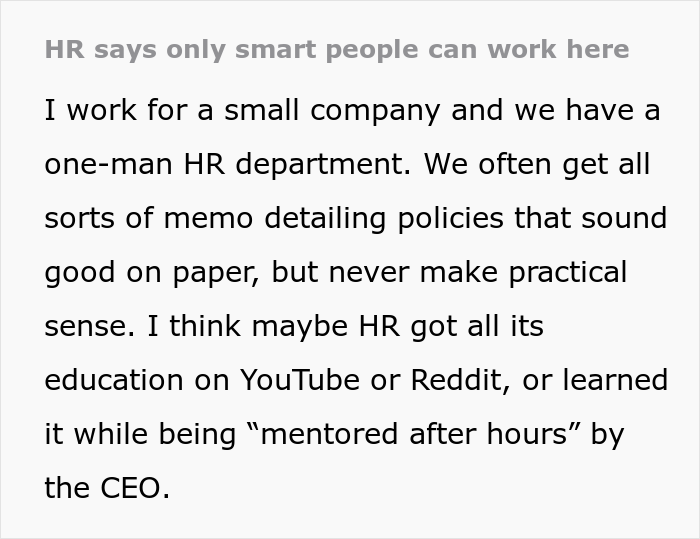
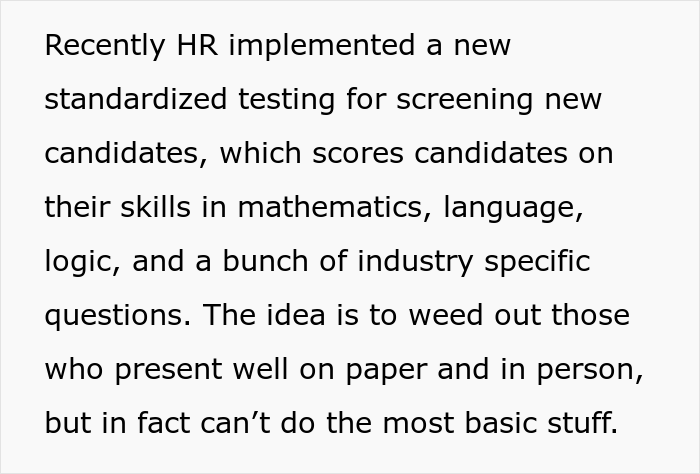
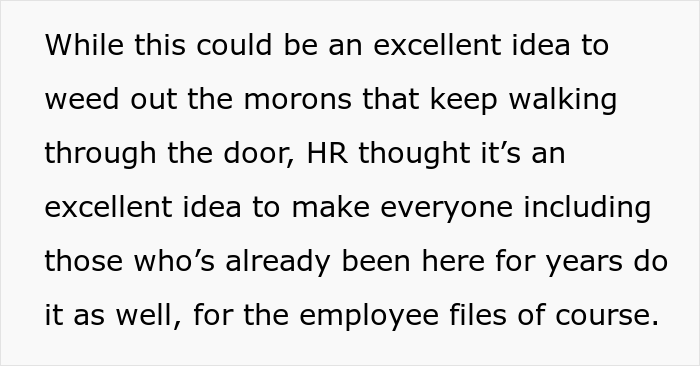
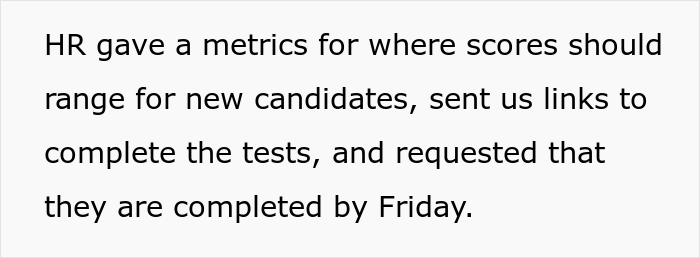
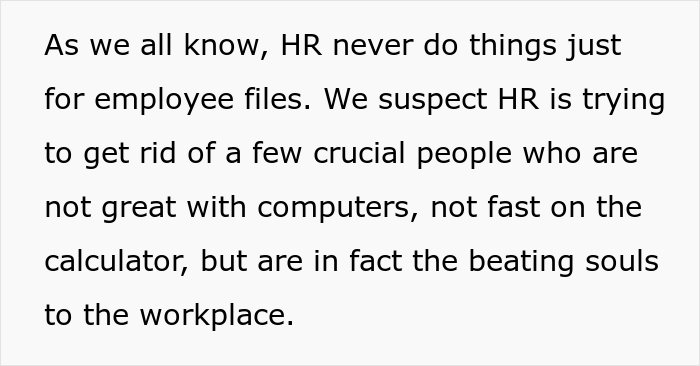
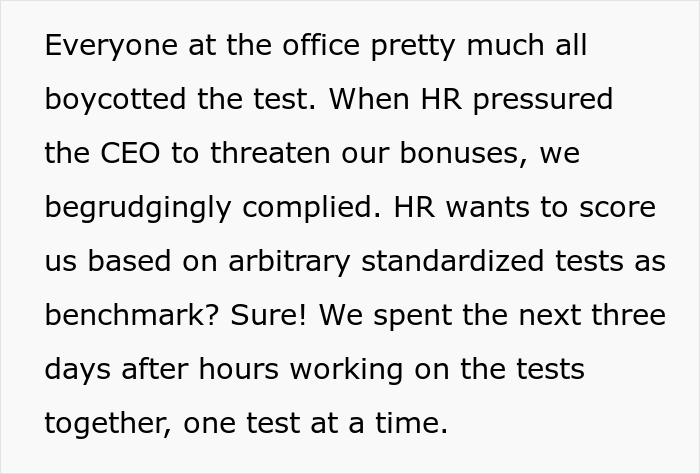


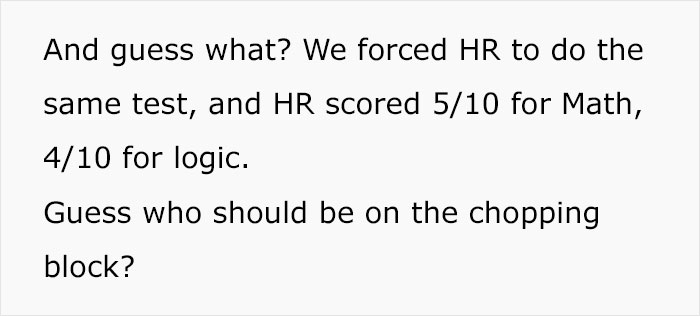
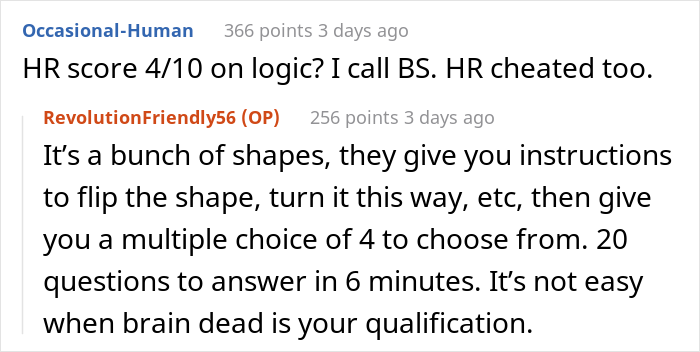



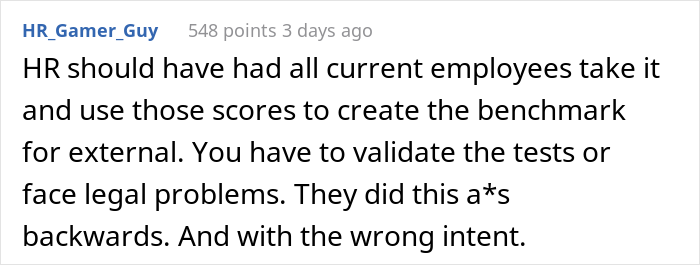

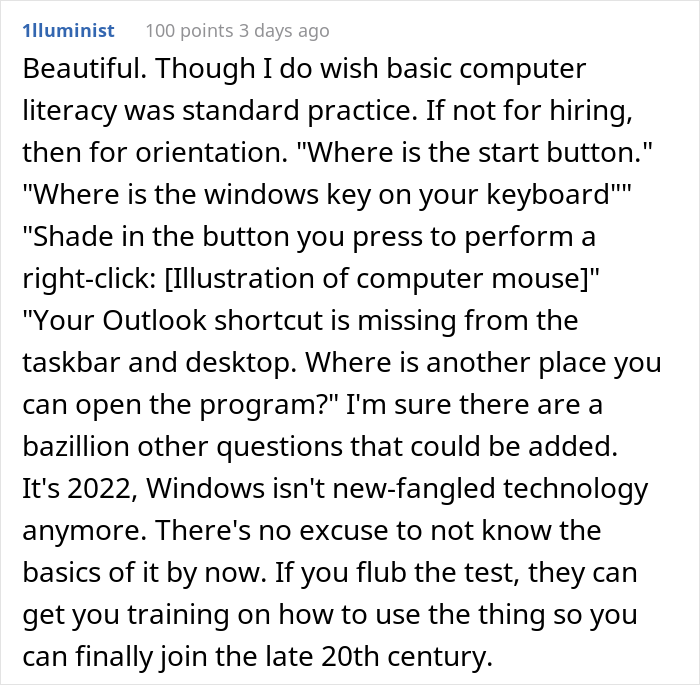

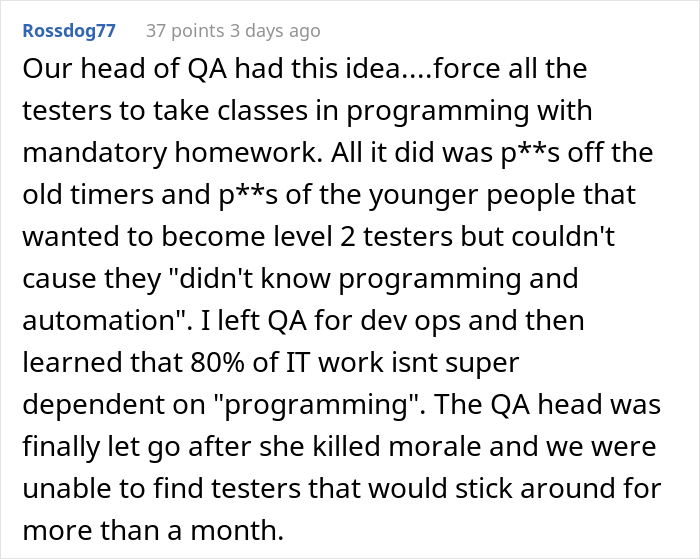
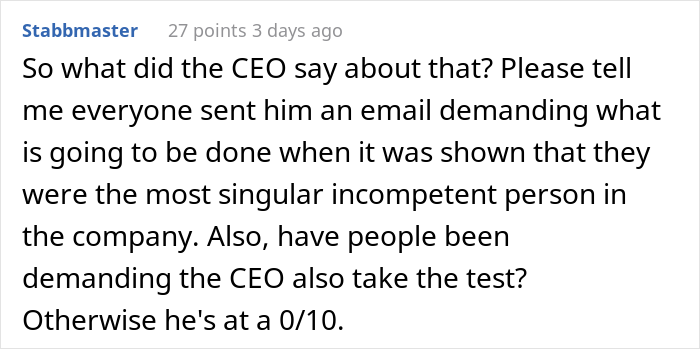
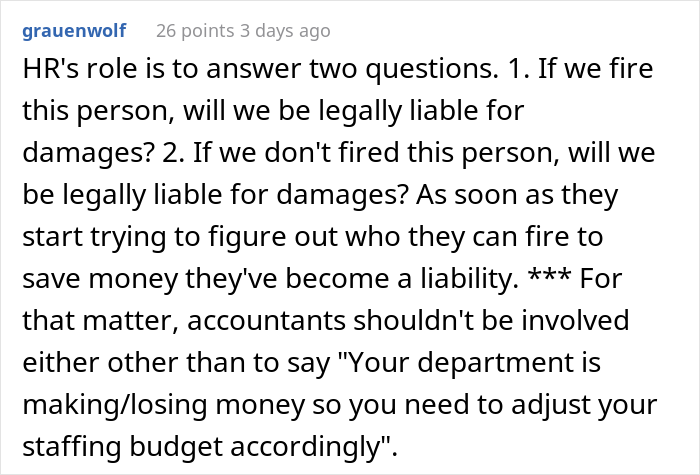


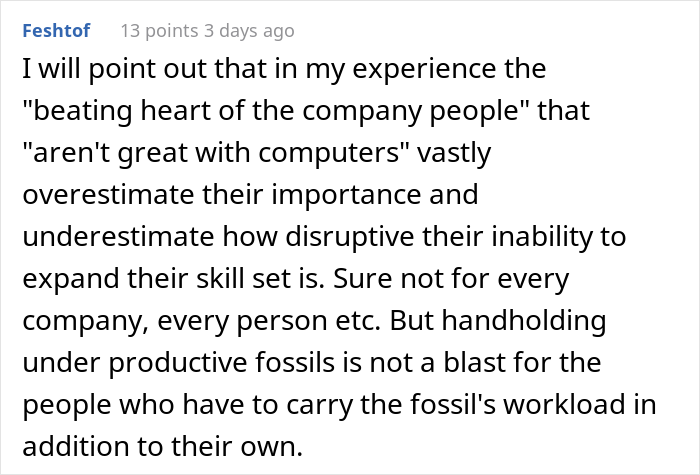
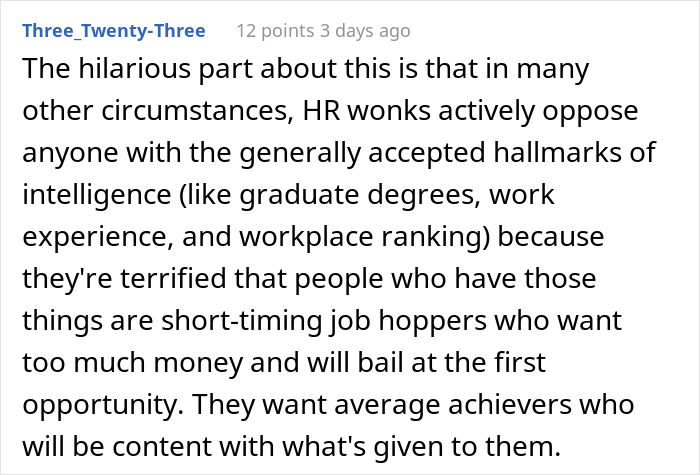
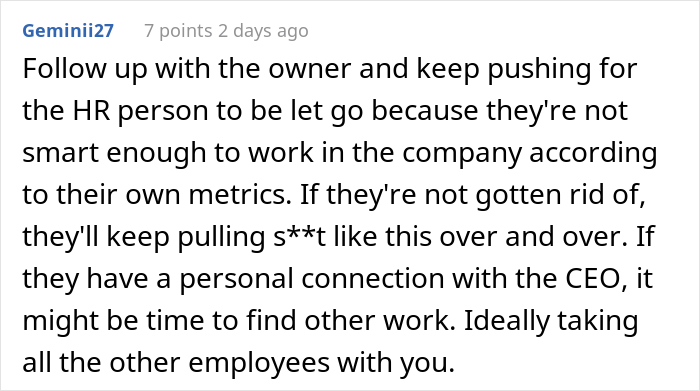












































42
25